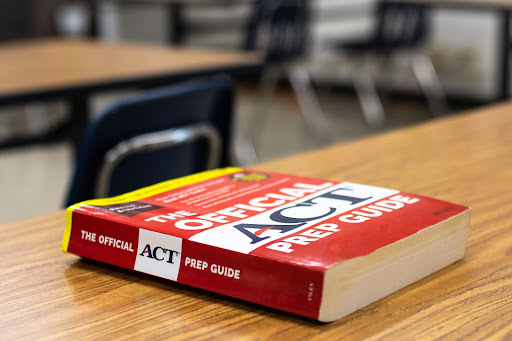Me, Personally, I Wouldn’t Take That (the SAT and ACT)

Art/Photo by Sullivan Kolakowski
In order to prepare for the SAT and ACT, many students purchase prep guides and workbooks, dedicating precious time to studying in hopes of scoring well on these standardized tests. Test prep was once a universal part of the high school experience: The SAT and ACT were previously regarded as absolutely necessary for anyone going to college. It would take six years and a global pandemic to change the test’s mandatory status.
After nearly 60 years, the University of California has decided to stop requiring SAT scores in its admissions process. Good.
The writing was on the walls. For years, talk of a “test-blind” world rumbled in board meetings and classrooms, bolstered by the SAT’s decidedly discriminatory scoring. You, me, and the low-income families who can’t afford it know that private tutors and practice tests make a difference. The Princeton Review “guarantees” a score of 1400 on a test that is, supposedly, an unbiased gauge of student ability — for $1,900.
The SAT’s fundamental problem, however, is not one of price but one of principle. From its earliest days as an IQ test for soldiers going off to war, the SAT has existed to strip humans of their individuality and replace it with a neat, satisfying number — an unfortunate (but necessary) placement tool for army management. Puzzlingly, we still use that test for college admissions.
If the purpose of a university is to churn out soldiers — obedient workers who fit a precise mold — then a universal standardized test makes sense. In war, uniformity is an asset; you win by training your men to think, talk, and act the same. But college is not war. With so much emphasis on a study-able, multiple choice test, students are encouraged to strive for sameness; time that could be spent honing a genuine, unique passion is squandered on practicing review questions and guessing methods.
Jonathan Sleeman (12) said it best. As a senior who scored well on the ACT (comparable to the SAT in both its content and flaws), he asserted that the exam only measures “your ability to study for it,” and not college readiness. The question, then, is why take either test at all? The answer: most private universities still want you to.
Though America has been gradually progressing towards test-blindness, there are still some notable pro-SAT/ACT holdouts; Georgetown, Carnegie Mellon, and thousands of other universities require applicants to send in their test scores. Aneesh Srirambhatla (11), much like Sleeman, feels obligated to take the SAT. He, with every other junior at West High, completed the mandatory PSAT on Tuesday, October 26; he plans to take the official exam in spring, without any tutoring or private lessons. Srirambhatla knows he’ll be “at a disadvantage,” but has no other option but to take it.
There are plenty of better options to fill the SAT/ACT void. For starters, colleges could put more emphasis on character and personal qualities, like they always should have. If schools still want an objective, easily-quantifiable measure, Sleeman pointed out that we already have a system in place: high school grades. As opposed to a single, gameable test, they offer a more holistic view of a student’s academic readiness. When compared with other students from your classes (and by comparing school to school), a relatively level playing field is created — something the two tests don’t do.
*The opinions expressed in our Opinion articles are the author’s own and do not necessarily express the views of the Signals Staff or West High as a whole.








